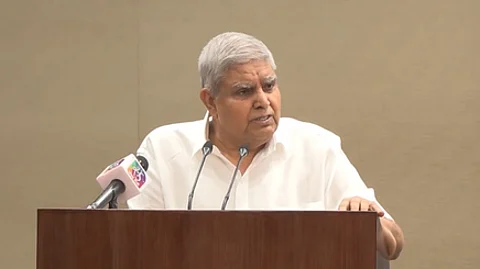

Vice President Jagdeep Dhankhar, on Thursday, April 18, termed the recent decision of the Supreme Court as “judicial overreach.” Dhankhar said the judiciary is constitutionally empowered to interpret laws but not to direct the functioning of the executive. “We cannot have a situation where you direct the President of India. Where are we heading? What is happening in the country?” he said while speaking at an interaction with Rajya Sabha interns.
The Vice President made these remarks in response to the Supreme Court’s recent judgement that set a timeline for the President to act on bills forwarded by state governors.
He further added, “There is a principle of accountability in operation in the executive. But if this executive governance is by the judiciary, how do you ask questions? Whom do you hold accountable in the election?”
The Vice President also raised concerns over the ongoing controversy surrounding the alleged recovery of burnt currency notes from the residence of a Delhi High Court judge. Referring to the delay in initiating a formal criminal investigation, he pointed out that no FIR had been filed in the case so far, despite the seriousness of the alleged offence. “It has now been over a month. Even if it is a can of worms, even if there are skeletons in the cupboard—time to blow up the can. Time for its lid to go out. And time for the cupboard to collapse. Let the worms and skeletons be in the public domain so that cleansing takes place.”
Dhankhar argued that while the Constitution grants immunity from prosecution only to the President and Governors, in practice, judges seem to be enjoying a level of protection not envisaged by the law, he said.
“An FIR in this country can be registered against anyone… But if it is the Judges category, FIR cannot be registered straightaway. It has to be approved by the concerned in the judiciary, but that is not given in the Constitution,” he said
Speaking about what he sees as judicial overreach, the Vice President questioned the legal authority of the Supreme Court-appointed panel of three judges investigating the matter. “Is the committee under the Constitution of India? No. Is this committee of three judges sanctioned by any law passed by Parliament? No. The committee can at most make a recommendation. A recommendation to whom? And for what?” he asked.
He also reiterated that while courts have the authority to interpret the Constitution, they do not have the power to legislate or direct the executive. “There is a principle of accountability in operation in the executive. In Parliament, you can ask questions—critical questions—because the governance is by the executive. But if this executive governance is taken over by the judiciary, how do you ask questions? Whom do you hold accountable in the election?”
Calling it a test case for Indian democracy, the Vice President urged for institutional introspection. “The time has come when our three institutions—the legislature, judiciary, and executive—must blossom. And they blossom best, and best for the nation, only when they operate in their own area,” he concluded.